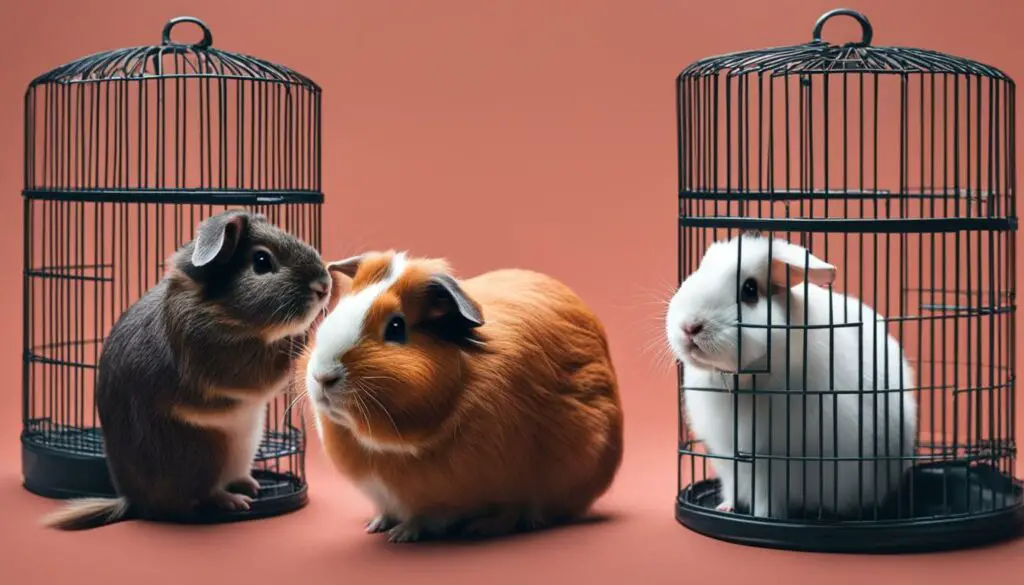Are you considering housing guinea pigs and rabbits together? It’s important to understand their compatibility and whether it’s safe for them to coexist. While both animals are sociable creatures that require companionship, they have different needs and should not be housed together. Let me explain further.
Guinea pigs and rabbits have different dietary requirements, social needs, and behaviors. Additionally, there are potential risks associated with housing them together, such as aggression and the transmission of infections. To ensure the well-being of both animals, it’s generally recommended to choose one species or the other, rather than attempting to house them together.
Key Takeaways:
- Guinea pigs and rabbits have different dietary needs, with guinea pigs requiring additional vitamin C.
- Rabbits and guinea pigs have distinct social needs, requiring the company of their own species.
- Rabbits can be larger and more aggressive than guinea pigs, posing a risk to the smaller animals.
- Rabbits need more space than guinea pigs to exhibit their natural behaviors.
- Rabbits can carry a respiratory infection that can be fatal to guinea pigs.
They Need Different Diets
Guinea pigs and rabbits have distinct dietary requirements that must be taken into consideration when housing them together. While both animals consume hay as a crucial part of their diet, there are specific nutritional needs that differ between the two species.
Guinea pigs, for example, have a unique requirement for vitamin C. Unlike rabbits, they are unable to produce this essential nutrient on their own. Therefore, it is crucial to provide guinea pigs with a diet that includes foods rich in vitamin C or supplements to ensure their well-being. On the other hand, rabbits should not consume excess vitamin C, as it can lead to health issues.
Feeding guinea pigs and rabbits separately is recommended to ensure that each species receives the appropriate nutrition. While both should have access to fresh fruits and vegetables, it’s essential to provide guinea pigs with additional vitamin C sources and limit their intake for rabbits accordingly. By meeting their distinct dietary needs, we can contribute to the overall health and happiness of both guinea pigs and rabbits.
| Guinea Pigs | Rabbits |
|---|---|
| Require foods rich in vitamin C | Should not consume excess vitamin C |
| Eat hay as a primary component of their diet | Also rely on hay as a main dietary staple |
| Benefit from fresh fruits and vegetables | Benefit from fresh fruits and vegetables |
Table: A comparison of the dietary needs of guinea pigs and rabbits.
Rabbits Need Rabbit Friends, Guinea Pigs Need Guinea Pig Friends
When it comes to social needs, rabbits and guinea pigs have distinct requirements. While both species are sociable and enjoy the company of others, they communicate differently and have specific companionship needs. Guinea pigs need the companionship of other guinea pigs, while rabbits require the company of other rabbits. So, if you’re considering housing these animals together, it’s important to understand that it will not resolve their loneliness.
Rabbits are known to form strong bonds with their fellow rabbits, engaging in activities such as grooming, playing, and even napping together. They share a language and behavioral patterns that are unique to their species. Similarly, guinea pigs have their own social structure and communication methods, relying on vocalizations, body language, and behaviors specific to their kind. They thrive when they are surrounded by their fellow guinea pigs.
Attempting to house rabbits and guinea pigs together can lead to stress, misunderstanding, and potentially aggressive behavior. Remember, rabbits may perceive guinea pigs as individuals of their own species and may try to establish dominance or territory. This can put the smaller and more delicate guinea pigs at risk of harm. It’s essential to prioritize the social needs of each species and provide them with appropriate companionship.
Differences in Social Needs:
- Rabbits need the company of other rabbits to fulfill their social needs.
- Guinea pigs require the companionship of other guinea pigs to thrive.
- Housing rabbits and guinea pigs together will not resolve their loneliness.
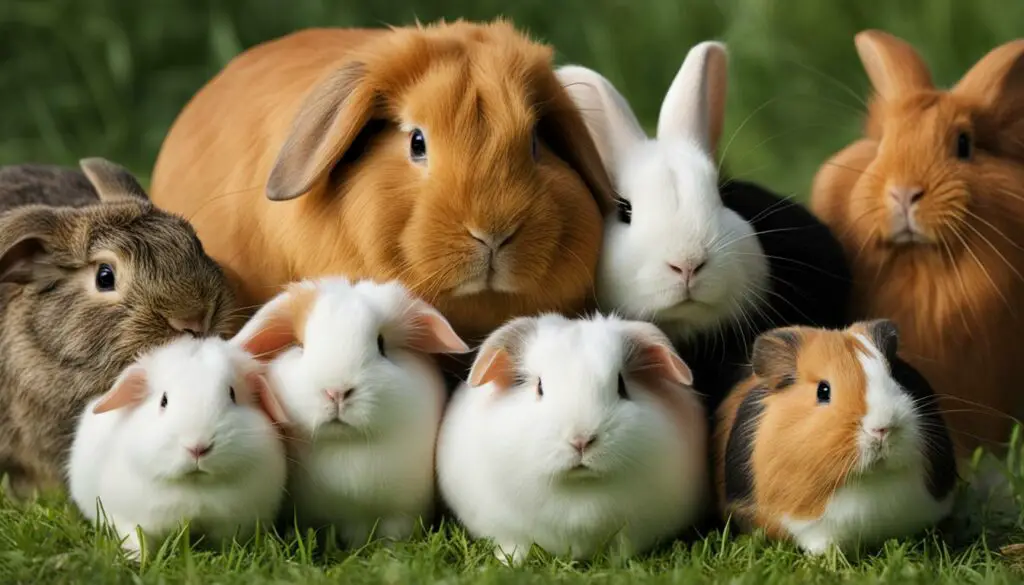
| Species | Companionship Requirements |
|---|---|
| Rabbits | Need the company of other rabbits to form strong bonds and engage in species-specific behaviors. |
| Guinea Pigs | Require the companionship of other guinea pigs to fulfill their social needs and thrive. |
They Can Be Bullies
Rabbits can sometimes exhibit aggressive behavior towards guinea pigs, which can potentially harm the smaller animals. Due to their size and strength difference, rabbits may kick, scratch, or bully guinea pigs. This aggressive behavior can lead to physical injuries and even nutritional problems for the guinea pigs.
It is essential to recognize that rabbits are naturally bigger and more dominant than guinea pigs, and their behavior can reflect this. While not all rabbits will display aggressive tendencies, it is a risk that should be taken into consideration when housing these two species together.
When rabbits bully guinea pigs, it can cause significant distress for the smaller animals. Guinea pigs may become fearful and anxious, resulting in a decrease in their overall well-being and quality of life. Therefore, it is important to closely monitor their interactions and separate them if any signs of aggression are observed.
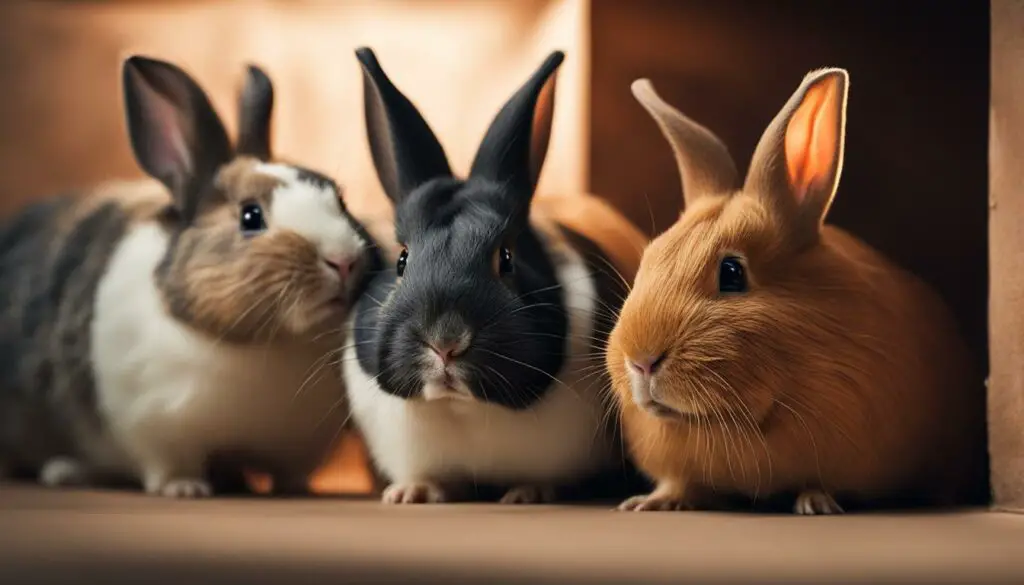
Table: Advantages and Disadvantages of Housing Guinea Pigs and Rabbits Together
| Advantages | Disadvantages |
|---|---|
| Provides social interaction for the animals | Risk of rabbits bullying guinea pigs |
| Opportunity for companionship between species | Size and strength difference can put guinea pigs at risk |
| Potential for shared resources and entertainment | Incompatibility of dietary needs |
While it is possible for guinea pigs and rabbits to coexist, it is crucial to consider the potential risks involved. The aggressive behavior of rabbits towards guinea pigs can have detrimental effects on the smaller animals’ physical and emotional well-being. The size and strength difference between the two species make guinea pigs more vulnerable to harm.
If you choose to house these animals together, it is important to provide ample space for each species to retreat and separate them if any signs of aggression arise. Additionally, closely monitoring their interactions and ensuring their dietary needs are met individually is crucial for their overall health and safety.
Rabbits Require a Lot More Space
When considering housing guinea pigs and rabbits together, it is important to take into account the space requirements of each species. Rabbits, being larger and more active, require a lot more space compared to guinea pigs. While a hutch may be sufficient for guinea pigs, rabbits need ample room to exhibit their natural behaviors.
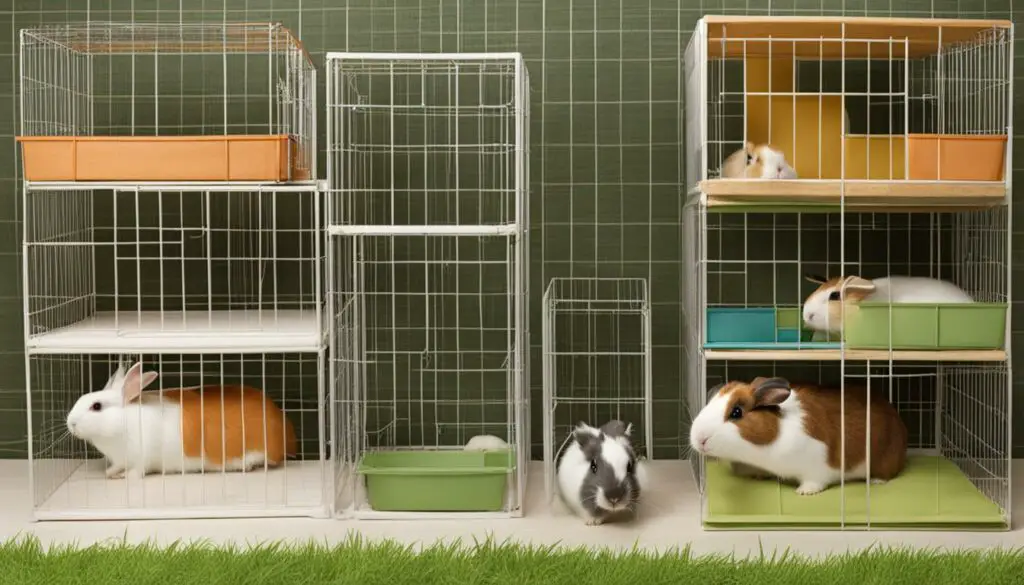
A suitable housing option for rabbits is a large enclosure that allows them to hop, run, and explore. This could be an outdoor playpen or a spacious indoor pen. The minimum recommended size for a pair of rabbits is around 12 square feet, but the more space they have, the better. It is important to provide them with enough room to move around comfortably and engage in their natural behaviors.
Guinea pigs also require space, but their size allows for a smaller housing option. While a hutch may be suitable for them, it is essential to provide ample room for exercise and exploration. A minimum cage size for a pair of guinea pigs is around 7.5 square feet, but larger is always better. It is important to remember that both species should have access to a safe and secure outdoor area for supervised playtime, as long as it is suitable for their specific needs.
| Rabbits | Guinea Pigs | |
|---|---|---|
| Minimum Cage Size | 12 square feet | 7.5 square feet |
| Ideal Housing Option | Large outdoor enclosure or spacious indoor pen | Hutch or cage with ample room for exercise |
| Additional Space Requirements | Access to a safe and secure outdoor area | Access to a safe and secure outdoor area |
Rabbits May Pass On Infections to Guinea Pigs
Rabbits can carry a respiratory infection called Bordetella bronchiseptica, which may not cause symptoms in rabbits but can be fatal to guinea pigs. This infection can easily be transmitted, causing pneumonia in guinea pigs. It is important to consider the health risks when considering housing these species together.
According to a study conducted by the Department of Veterinary Medicine at the University of Cambridge, respiratory infections were found to be the most common cause of illness in guinea pigs. These infections can result in severe respiratory distress, weight loss, and even death if left untreated. Therefore, it is crucial to prioritize the health and well-being of both guinea pigs and rabbits and take necessary precautions to prevent the transmission of infections.
To ensure the safety of both species, it is recommended to keep guinea pigs and rabbits in separate enclosures. This reduces the risk of disease transmission and allows for appropriate monitoring of each animal’s health. Additionally, regular veterinary check-ups are essential to detect any potential infections early on and provide the necessary treatment.
| Risks | Preventive Measures |
|---|---|
| Bordetella bronchiseptica infection in rabbits | Keep guinea pigs and rabbits in separate enclosures |
| Respiratory infections in guinea pigs | Regular veterinary check-ups and prompt treatment |
By prioritizing the health of both guinea pigs and rabbits, owners can ensure a safe and comfortable living environment for their pets. It is important to understand and respect the unique needs of each species and provide appropriate housing and care accordingly. With proper attention to health risks and preventive measures, guinea pigs and rabbits can thrive individually, leading to happier and healthier lives.
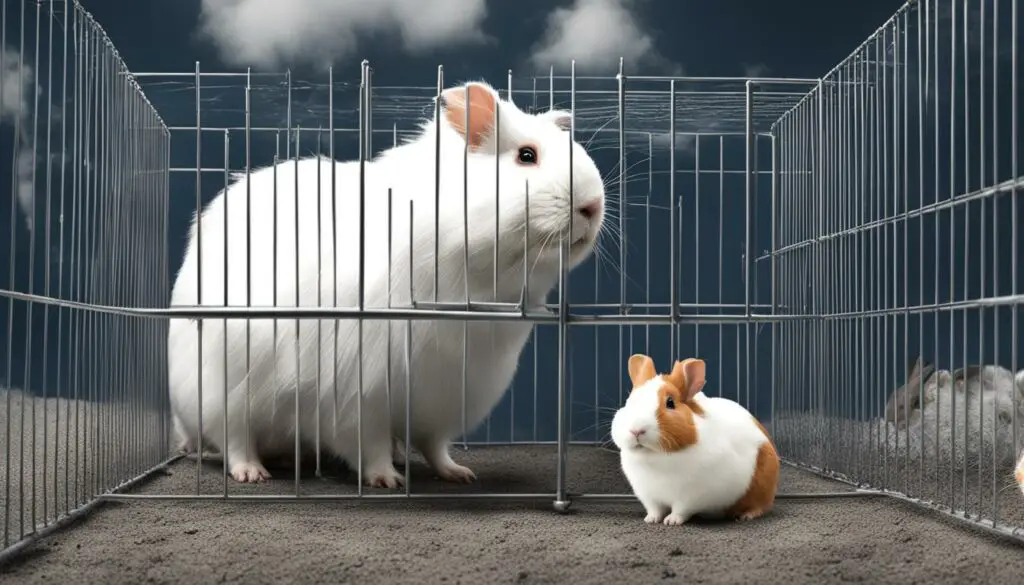
Some Dietary Requirements Are the Same
When it comes to feeding guinea pigs and rabbits, there are some similarities in their dietary needs. Both species require a good quality hay as the main component of their diet. Hay provides the necessary fiber for their digestive systems and helps maintain dental health.
Additionally, both guinea pigs and rabbits should be fed pelleted food. However, it’s important to note that guinea pig food needs to be supplemented with extra vitamin C, as they cannot produce it on their own. Overfeeding pellets can lead to weight gain, so it’s important to feed both species the appropriate amount.
It’s crucial to feed guinea pigs and rabbits separately to ensure they receive the proper nutrition. Guinea pigs require additional vitamin C, and their food should be supplemented accordingly. On the other hand, rabbits should not consume excess vitamin C, as it can make them unwell. Feeding them separately also prevents any aggression or competition over food.
| Guinea Pigs | Rabbits | |
|---|---|---|
| Hay | X | X |
| Pellets | X | X |
| Extra Vitamin C | X |
Overall, while there are some dietary requirements that are the same for guinea pigs and rabbits, it’s important to pay attention to their individual needs to ensure they receive the appropriate nutrition.
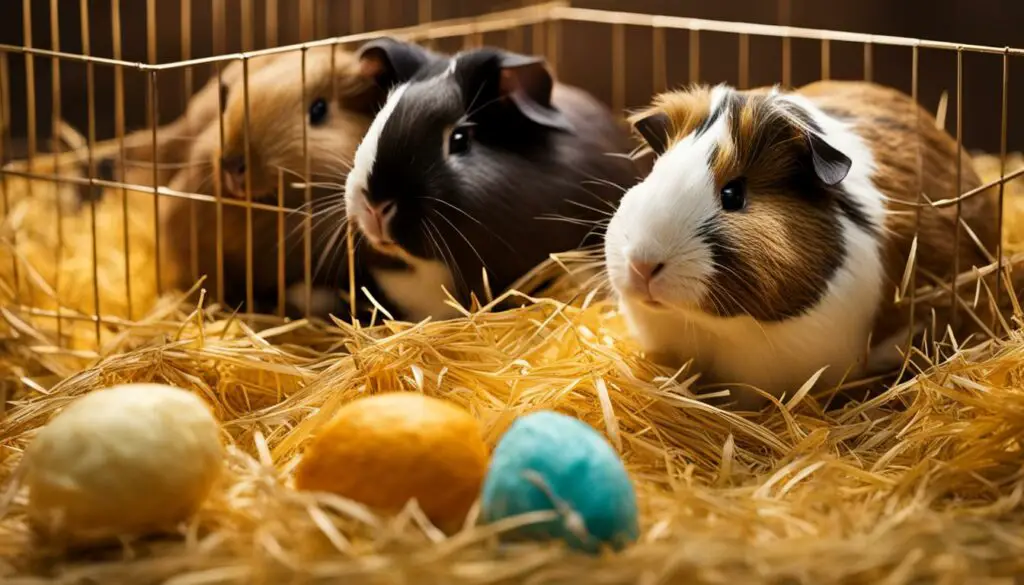
Behavioral Differences
Understanding the distinct behaviors of guinea pigs and rabbits is crucial when considering housing them together. Guinea pigs are naturally social animals that thrive on human interaction and the companionship of other guinea pigs. They enjoy gentle petting and communicate with various sounds such as squeaks, purrs, and wheeks. Rabbits, on the other hand, are more independent and require their own space. They are known for their inquisitive nature and may exhibit behaviors such as hopping, binkying (joyful jumps), and thumping their hind legs to signal danger.
Guinea pigs and rabbits also have different communication styles. Guinea pigs rely on vocalizations and body language to express their feelings and needs. They may wag their hindquarters to show contentment or raise their hackles when they feel threatened. In contrast, rabbits communicate primarily through body language, such as ear positions, tail movements, and facial expressions. They may display behaviors like circling, lunging, or nipping to establish dominance or defend their territory.
When it comes to play behaviors, guinea pigs are more interactive and enjoy exploring their surroundings, chasing toys, and participating in gentle games. They may also engage in popcorning, where they jump into the air with excitement. Rabbits, on the other hand, are known for their acrobatic skills and may perform zoomies, running and twisting in bursts of energy. They also enjoy digging, chewing, and tossing toys, which are essential for their physical and mental stimulation.
Understanding these behavioral differences between guinea pigs and rabbits is important for their well-being and successful cohabitation. Providing an environment that caters to their specific needs and allowing them separate spaces within a shared enclosure can help ensure their happiness and minimize potential conflicts.
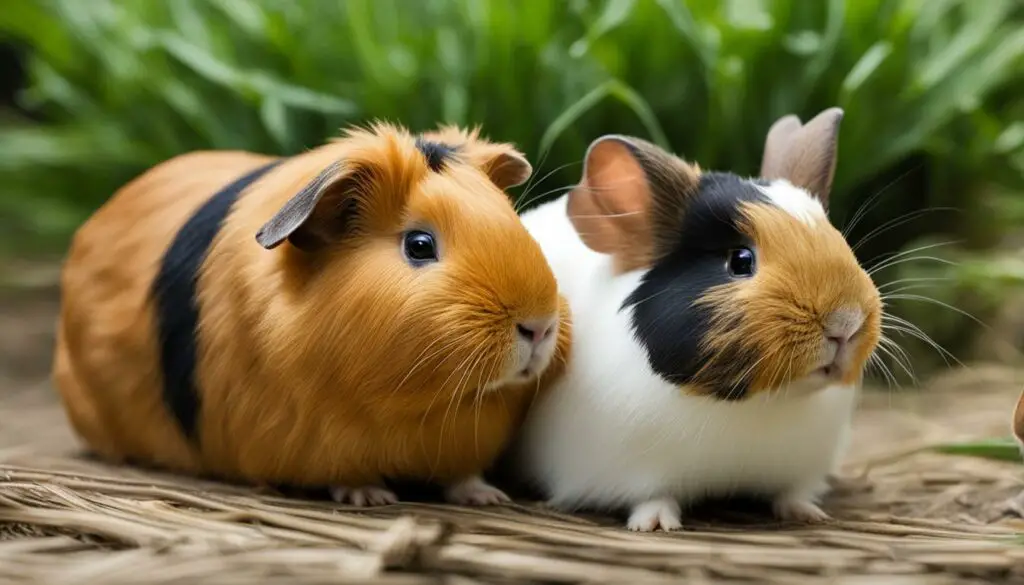
Table: Comparison of Behavioral Traits
| Behavioral Traits | Guinea Pigs | Rabbits |
|---|---|---|
| Social Nature | Highly social, enjoy the companionship of other guinea pigs | More independent, may or may not enjoy the company of another animal |
| Communication | Use vocalizations and body language | Rely on body language, ear positions, tail movements |
| Play Behaviors | Interactive, enjoy exploring, chasing toys, and gentle games | Acrobatic, perform zoomies, enjoy digging, chewing, and tossing toys |
Can Guinea Pigs and Rabbits Coexist in the Same Cage or Hutch?
Coexisting guinea pigs and rabbits in the same cage or hutch requires careful consideration of their individual needs and behaviors. While it is not recommended to house them together due to their different requirements, it may be possible with proper measures in place. Here are some important factors to consider:
Space Requirements:
Both guinea pigs and rabbits need ample space to live comfortably. The minimum cage or hutch size should be based on the requirements of the larger species, ensuring that there is enough room for both animals to move around freely. It is essential to provide separate spaces within the enclosure to allow for alone time and prevent any potential conflicts.
Preventing Aggressive Behavior:
Rabbits can exhibit territorial and aggressive behavior towards guinea pigs. This can result in bullying, harm, and nutritional problems for the smaller guinea pigs. To prevent such issues, it is recommended to neuter rabbits, as this can help reduce their aggressive tendencies. Additionally, providing hiding spots and separate feeding areas can help minimize conflicts between the two species.
Monitoring Health Risks:
Rabbits can carry a respiratory infection called Bordetella bronchiseptica, which can be fatal to guinea pigs. It is crucial to monitor the health of both animals closely and seek veterinary care immediately if any signs of illness occur. Regular check-ups and vaccinations can help prevent the spread of infections and ensure the well-being of your pets.
| Considerations for Coexistence | Guinea Pigs | Rabbits |
|---|---|---|
| Space Requirements | Minimum cage size based on guinea pig needs | Minimum cage size based on rabbit needs |
| Preventing Aggressive Behavior | Choose compatible guinea pig companions | Neuter rabbits to reduce aggression |
| Monitoring Health Risks | Regular check-ups and vaccinations | Monitor for respiratory infections |
While it is possible for guinea pigs and rabbits to coexist in the same cage or hutch, it is important to prioritize their individual needs and well-being. Providing appropriate space, preventing aggressive behavior, and monitoring for health risks are essential steps to ensure a harmonious living environment for both species.
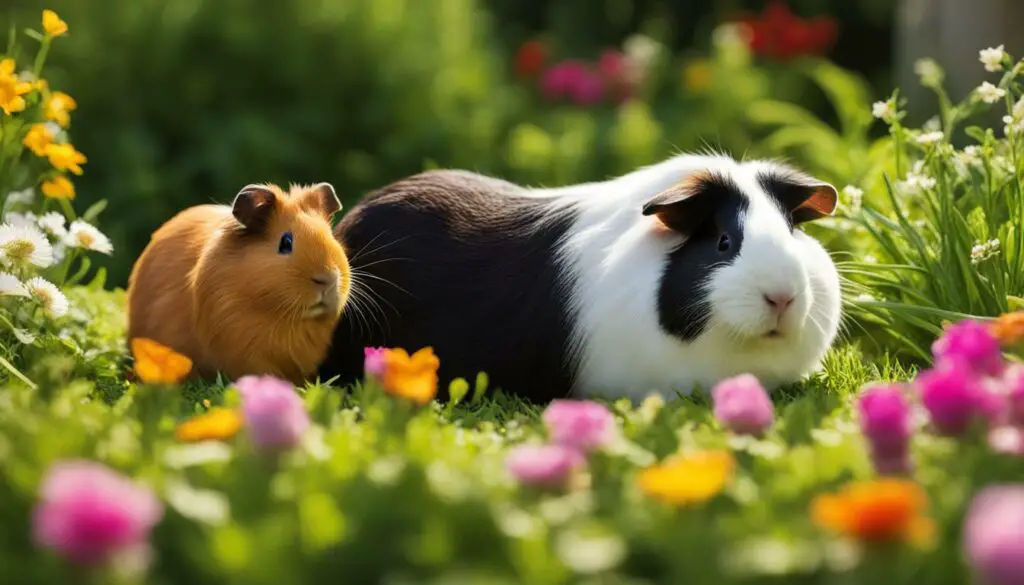
Size of Cage or Hutch
When considering housing guinea pigs and rabbits together, it is crucial to provide a spacious and suitable enclosure that can accommodate both species comfortably. The size of the cage or hutch should be based on the requirements of the larger species to ensure they have enough space to move around and exhibit their natural behaviors.
For rabbits, the minimum recommended enclosure size for a pair is at least 12 square feet (1.1 square meters). However, providing more space is always better for their well-being. Rabbits need ample room to hop, stretch, and play. It is important to note that a hutch alone may not be sufficient, as rabbits require additional exercise and enrichment outside of their enclosure.
On the other hand, guinea pigs are smaller than rabbits and have slightly different space requirements. A minimum of 7.5 square feet (0.7 square meters) is recommended for a pair of guinea pigs. While a hutch may be suitable for them, it is essential to ensure they have enough space to move and explore their surroundings.
| Species | Minimum Enclosure Size |
|---|---|
| Rabbits | 12 square feet (1.1 square meters) for a pair |
| Guinea Pigs | 7.5 square feet (0.7 square meters) for a pair |
Keep in mind that these are minimum recommendations, and providing larger enclosures will greatly benefit the overall well-being of both guinea pigs and rabbits. Having ample space allows them to exercise, explore, and enjoy their environment.
Companionship
When it comes to guinea pigs and rabbits, understanding their social needs is crucial for their well-being. Guinea pigs are highly social animals and thrive when they have the company of other guinea pigs. They enjoy interaction and communication with their fellow furry friends. On the other hand, rabbits may or may not appreciate the company of another animal. While some rabbits may enjoy having a guinea pig as a companion, others may prefer to have their own space.
So, can guinea pigs and rabbits coexist in the same enclosure? The answer is yes, but it’s important to provide separate spaces within the enclosure to allow for alone time. This can be achieved by creating separate areas or using dividers to ensure that both species have their own designated space. Providing hiding spots and tunnels can also help create a sense of privacy.
It’s important to note that even if guinea pigs and rabbits get along well, they still have different needs and behaviors. Proper monitoring and understanding of their individual requirements are essential to ensure their companionship remains harmonious. By providing the necessary space and considering their social needs, it is possible for guinea pigs and rabbits to coexist in the same cage or hutch.
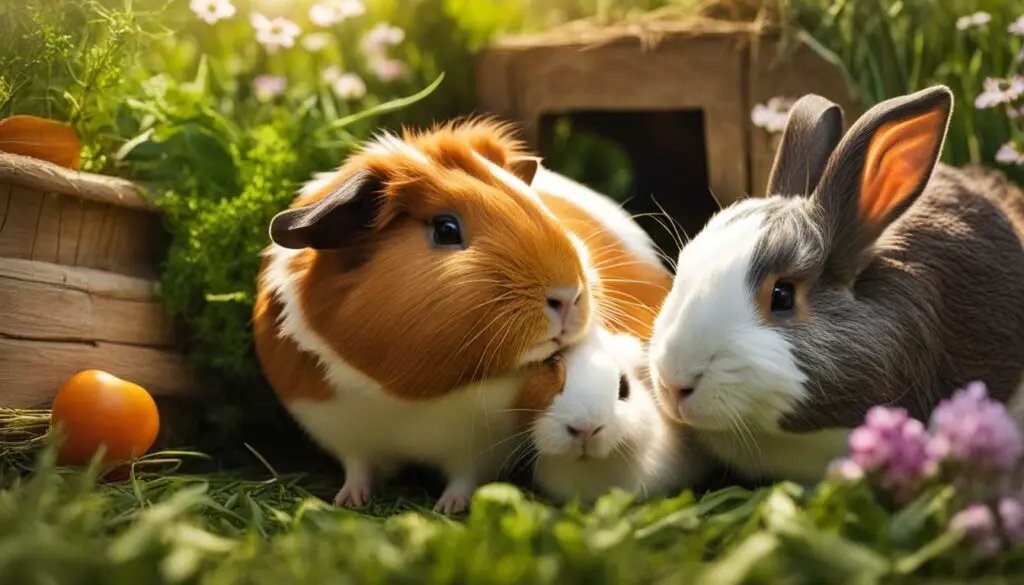
The benefits of companionship:
- Reduced stress and loneliness
- Opportunities for socialization and play
- Enhanced mental and emotional well-being
- Improved communication and bonding
The importance of separate spaces:
While it’s possible for guinea pigs and rabbits to live together, providing separate spaces within the enclosure is essential to ensure their individual needs are met. This allows them to have alone time and reduces the risk of conflicts or bullying. By creating designated areas and providing ample hiding spots, you can promote a harmonious living environment for both species.
Monitoring and evaluation:
Regular monitoring of their behavior, eating habits, and overall well-being is crucial when housing guinea pigs and rabbits together. This allows you to identify any signs of stress, aggression, or health issues. If any issues arise, it may be necessary to separate them to ensure their individual safety and well-being.
Providing enrichment:
Enrichment activities such as toys, tunnels, and hiding spots can help keep both guinea pigs and rabbits mentally stimulated and engaged. Providing a variety of toys and environmental enrichment can help prevent boredom and promote a happy and fulfilled life for both species.
In summary, while it’s possible for guinea pigs and rabbits to coexist, it’s important to consider their individual needs and behaviors. Providing separate spaces, monitoring their interactions, and providing enrichment are essential for their well-being. By understanding and meeting their social needs, you can create a harmonious living environment for both guinea pigs and rabbits.
Dietary Needs
Proper nutrition is crucial for the health and well-being of guinea pigs and rabbits. While both species have certain dietary requirements in common, there are also some distinct differences to consider.
Guinea Pig Diet
Guinea pigs have a unique need for vitamin C in their diet. Unlike rabbits and many other animals, guinea pigs cannot produce their own vitamin C and rely on dietary sources. Therefore, it is essential to provide them with a balanced diet that includes foods rich in this nutrient.
Guinea pigs should have access to fresh hay, which should make up the majority of their diet. In addition to hay, they should also be fed high-quality guinea pig pellets, which are specifically formulated to meet their nutritional needs. These pellets should be supplemented with fresh fruits and vegetables that are safe for guinea pigs to eat.
“A well-rounded guinea pig diet consists of hay, pellets, and fresh produce. However, it’s important to be aware that guinea pigs have a higher requirement for vitamin C compared to rabbits. Therefore, it is recommended to provide them with vitamin C supplements or choose pellets that are fortified with this essential nutrient.”
Rabbit Diet
Rabbits, on the other hand, have different dietary needs. Their diet should primarily consist of high-quality hay, such as timothy hay, which is essential for proper digestion and dental health. Hay should make up the majority of their diet and be available at all times.
In addition to hay, rabbits should be provided with a small amount of high-quality pellets that are formulated specifically for rabbits. These pellets should be fed in moderation, as overfeeding can lead to weight gain and other health problems. Fresh vegetables can also be offered as occasional treats, but be sure to avoid foods that are toxic to rabbits.
It is important to note that rabbits should not be given vitamin C supplements, as they do not require extra vitamin C in their diet. In fact, too much vitamin C can be harmful to rabbits. Therefore, it is essential to provide them with a balanced diet that meets their specific nutritional needs.
| Guinea Pig Diet | Rabbit Diet |
|---|---|
| Hay (timothy, orchard grass) | Hay (timothy, orchard grass) |
| Guinea pig pellets | Rabbit pellets |
| Fresh fruits and vegetables | Fresh vegetables (as treats) |
| Vitamin C supplements (if required) | Not required |
It is important to provide each species with a diet that meets their specific nutritional requirements and to avoid overfeeding or providing inappropriate foods. By understanding the dietary needs of guinea pigs and rabbits, you can ensure that they receive the proper nutrition for a healthy and happy life.
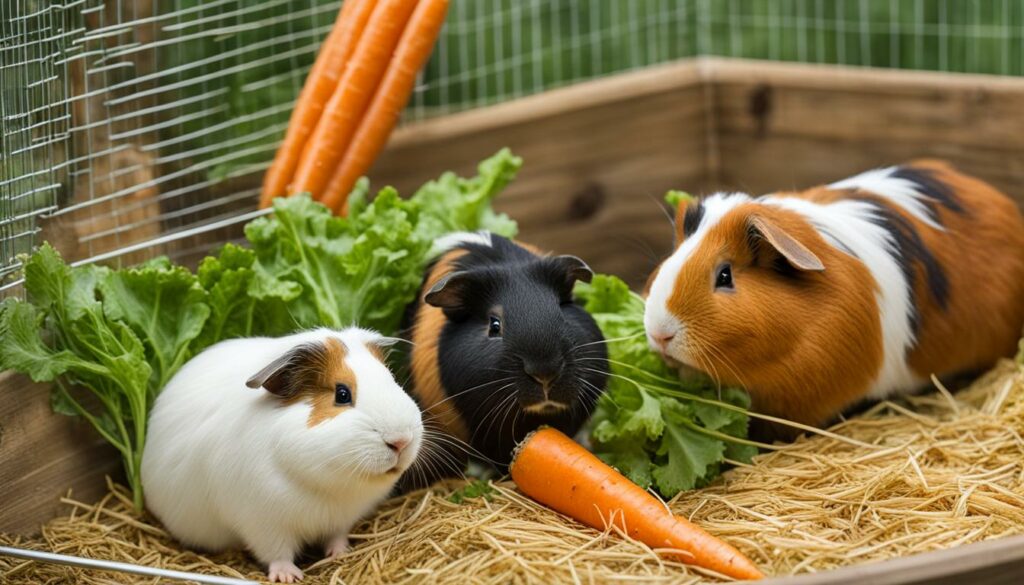
Tips to Keep Your Pets Safe
When housing guinea pigs and rabbits together, it is essential to prioritize their safety and ensure their well-being. Here are some important safety measures to follow:
- Create a Safe Space: Provide a secure and spacious enclosure that is suitable for both species. Ensure there are no gaps or holes where smaller guinea pigs can escape or larger rabbits can become stuck. Regularly inspect the enclosure for any potential hazards and make necessary repairs or adjustments.
- Feed Them Separately: Guinea pigs and rabbits have different dietary needs and feeding them separately is crucial. This ensures that each animal receives the appropriate nutrition without the risk of overfeeding or inadvertently sharing foods that can be harmful to one another.
- Neuter Rabbits: If housing a male rabbit with guinea pigs, it is recommended to have the rabbit neutered. Unneutered male rabbits can display aggressive behavior, potentially causing harm to the guinea pigs. Neutering can help reduce aggression and create a more harmonious living environment.
- Provide Hiding Places: Both guinea pigs and rabbits benefit from having hiding places in their enclosure. This allows them to retreat and feel secure when they need some alone time. Provide suitable hiding spots such as tunnels, boxes, or small shelters.
- Regular Monitoring: Keep a close eye on the interactions between the guinea pigs and rabbits. Monitor for any signs of aggression, stress, or injury. If any issues arise, it may be necessary to separate the animals to ensure their safety and well-being.
By following these safety measures, you can create a safe and comfortable living environment for your guinea pigs and rabbits. Remember to always prioritize their individual needs and monitor their interactions to ensure a happy and healthy coexistence.
Conclusion
After careful consideration, it is generally recommended that guinea pigs and rabbits should not be housed together. While it is possible for them to coexist, their different needs and behaviors make it challenging to provide suitable companionship and housing for both species.
Guinea pigs and rabbits have different dietary requirements, with guinea pigs needing additional vitamin C in their diet. Rabbits can be bigger and more aggressive, potentially causing harm to guinea pigs. Moreover, rabbits require a lot more space to exhibit their natural behaviors than guinea pigs do.
Additionally, rabbits can carry a respiratory infection that can prove fatal to guinea pigs. It is important to note that while some dietary requirements and behaviors may overlap, the overall differences between these two species make it best to choose one species or the other and provide them with appropriate companionship and housing.
FAQ
Can guinea pigs live with rabbits?
No, guinea pigs and rabbits should not be housed together.
Do guinea pigs and rabbits have different dietary requirements?
Yes, guinea pigs require additional vitamin C while rabbits should not consume excess vitamin C.
Do guinea pigs and rabbits have different social needs?
Yes, guinea pigs need the companionship of other guinea pigs, while rabbits require the company of other rabbits.
Can rabbits be more aggressive towards guinea pigs?
Yes, rabbits can be bigger and more aggressive than guinea pigs, posing a risk to the smaller guinea pigs.
Do rabbits require more space than guinea pigs?
Yes, rabbits need larger living spaces compared to guinea pigs.
Can rabbits pass on infections to guinea pigs?
Yes, rabbits can carry a respiratory infection that is fatal to guinea pigs.
Do guinea pigs and rabbits have similar dietary requirements?
Both animals require good quality hay, but guinea pigs need additional vitamin C.
Do guinea pigs and rabbits have different behaviors?
Yes, guinea pigs are more social and interactive, while rabbits are more independent.
Can guinea pigs and rabbits be housed together?
It is generally recommended to choose one species or the other and provide suitable companionship and housing.
How big should the cage or hutch be to house guinea pigs and rabbits?
The minimum size should be based on the requirements of the larger species.
Do guinea pigs and rabbits need separate companions?
Yes, guinea pigs need the company of other guinea pigs, and rabbits may or may not enjoy the company of another animal.
What are the dietary needs of guinea pigs and rabbits?
Guinea pigs require extra vitamin C, while rabbits have a diet mainly consisting of hay.
How can I keep my guinea pigs and rabbits safe?
Create a safe space for guinea pigs, feed them separately, and consider neutering rabbits to prevent aggressive behavior.
Can guinea pigs and rabbits be companions?
While they can coexist with careful planning and monitoring, it is generally recommended to choose one species and provide suitable companionship and housing.

